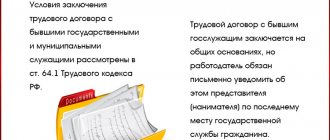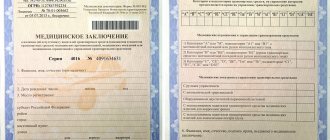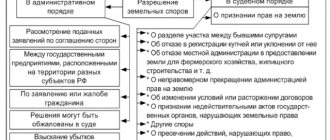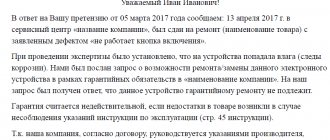Home / Family law / Parental rights / Deprivation
Back
Published: 03/02/2017
Reading time: 12 min
0
762
There are often cases when a divorce between parents is not enough to protect a child from the negative influence of his negligent father.
In this case, depriving this person of parental rights may be the only truly convenient way to, among other things, protect the child from various types of claims from his biological father in the future.
- What does the law recommend to do?
- On what grounds can a child’s father be deprived of parental rights?
- Required evidence
- The procedure for depriving a father of parental rights without his consent
- Can the child's father reject the claim?
- How to deprive parental rights for non-payment of child support and what will happen to child support
- Husband's rights to a child after deprivation of parental rights
What does the law recommend to do?
The Family Code of the Russian Federation contains a certain list of cases when parents may be deprived of their direct rights regarding their children.
Such cases are discussed in detail in Article 69 of this normative act. If we talk about the grounds that are mandatory for consideration in relation to deprivation of the father’s rights, they are also listed in this article.
The procedure for depriving parental rights itself, regardless of who exactly decided
thus punishing the state is considered within the framework of the Civil Procedure Code, since the deprivation of parental rights itself relates to civil proceedings.
These two regulations also contain a provision that practically excludes the possibility of depriving a father of his rights to a child without his consent. In accordance with the requirements of the current legislation, a lawsuit for deprivation of the parental rights of the child’s father can be considered only in the presence of the plaintiff, who can be a representative of the guardianship and trusteeship authorities, and a relative of the child, as well as the defendant, who will be considered the child’s father in a particular case.
This is due to the fact that the Russian judicial system uses the principle of adversarialism in defending their rights and interests by all parties to the legal process.
Grounds for depriving a father of parental rights
The full list of grounds is stated in Art. 69 RF IC. Each of the points may become a reason for depriving the father of a minor of his rights to participate in the life and upbringing of the minor.
In particular, the following points can be highlighted:
- the former spouse does not participate in the maintenance of the child from a financial point of view. This reason is quite common, but it is very important that simply the lack of financial payments for a minor is not a sufficient reason. The woman must prove that the citizen is evading payment of child support and is a persistent defaulter;
- the father does not participate in raising the child. The mother can go to court even if the citizen lives with the child, but does not participate in the life of the minor;
- the father has a negative influence on the baby, or meetings with the parent harm the child’s mental health. For example, the father is a drug addict or alcoholic, and also threatens the psyche and health of the little person.
On what grounds can a child’s father be deprived of parental rights?
The Family Code in Article 69 contains exhaustive grounds under which a father may be deprived of parental rights in relation to one or all of his children.
Such grounds will include:
- Systematic avoidance of resolving issues related to the upbringing and education of one’s children;
- Presence of medically documented alcohol or drug addiction;
- The presence of a persistent mental disorder, the exacerbation of which can pose a threat to the life and health of the child;
- Constant failure to pay alimony and accrued penalties and other penalties for existing debts;
- Manifestation of exceeding the limits of parental rights or cruel treatment of their minor children;
- Detection of facts of intentional harm to the health and life of minor children or spouses.
To make an appropriate decision, it is sufficient for the court to have one of these grounds and evidence of the reliability of the claims for deprivation of rights.
The process of deprivation can be carried out both during the divorce and after it.
Why can you deprive your ex-husband of parental rights?
The Family Code of the Russian Federation contains a list of those cases that may become the basis for depriving both parents of the rights to their children.
According to Article 69, the following may be grounds for deprivation of paternal rights:
- The father's systematic avoidance of solving problems of upbringing and education.
- Presence of alcohol or drug addiction, confirmed by medical examination reports.
- A mental disorder that poses a threat to the life and health of a child.
- Constant non-payment of alimony resulting in large debts.
- Exceeding the limits of parental rights or cruelty to minor children.
- Intentional harm to the health and life of children or spouse.
To deprive a father of his rights to a child, the presence of at least one of the above grounds is sufficient (if there is evidence of the credibility of the accusation).
The process of deprivation of rights can be opened both during the divorce and after it.
Required evidence
The process of depriving a former spouse of parental rights must be carried out with the mandatory preparation of all necessary documents, as well as other materials that will be used as evidence in the trial.
The Civil Procedure Code of the Russian Federation identifies two groups of evidence that can be used in court proceedings to deprive a father of parental rights:
- Documentary evidence that is necessarily in the nature of recorded materials on any media (both paper and digital and other media);
- Non-documentary evidence (which most often appears in the form of testimony of witnesses and experts who are directly related to the case under consideration, for example, are teachers and psychologists in an educational institution where a child is studying, whose father will be deprived of parental rights, or specialists who conducted an examination to identify any deviations or addictions in the father of the child).
If we talk about the necessary evidence that must be presented in court by the spouse in order to deprive the father of the child of parental rights, it should be noted that the following package of documents will need to be prepared as an appendix to the statement of claim:
- A certificate or medical report confirming the presence of addiction or mental disorder in the child’s father;
- Documents confirming the existence of arrears in the payment of alimony and penalties imposed for allowing such arrears, issued by bailiffs;
- In case of preventing the child from leaving the Russian Federation, a documented refusal of the father to allow the child to leave is also attached (such a refusal will be considered an abuse of his rights);
- Conclusion of the guardianship and trusteeship authorities on the father’s failure to fulfill his duties to raise the child and support him financially;
- Photo and video materials confirming facts of negative behavior of the child’s father.
If we talk about non-documentary evidence, then the following should be considered:
- Testimony from teachers, psychologists from social and educational institutions, neighbors who see the development of family relationships in a particular family and can form an objective impression of the events of this family;
- Testimony of experts and specialists whose interrogation will be carried out as part of the meeting in order to obtain a transcript of the data that was formed in the drafted conclusion in the case of the presence of specialized terms, an explanation of the meaning of which will be necessary.
The court carefully examines such evidence at the stage of preparation for the trial. If, when examining the evidence presented, the court has any doubts, the plaintiff or a person acting as a representative of the child and acting in his interests may be summoned to study the case at the preparation stage.
The procedure for depriving a father of parental rights without his consent
The entire procedure for depriving a father of parental rights is standard.
However, if he does not agree with the requirements, the procedure for proving in court the validity of the demands for deprivation may take a significant amount of time.
The number of stages will not increase and their number will be four:
- Filing a claim. As part of this stage, the document itself is prepared, as well as the requirements that will be presented to the child’s father are clarified (if the claim is filed not by the mother, but by a representative of the guardianship and trusteeship authorities or a prosecutor acting in the interests of the child and his mother);
- Providing all necessary documents that will be considered as evidence for depriving the father of parental rights; The legal process itself, during which all submitted materials are examined to determine the legality of the demands made against the child’s father;
- Obtaining a writ of execution and using it to ensure the safety of the child after the decision to restrict the father’s parental rights comes into force.
Each stage will have a significant impact on the final result, so at each of them it is necessary to make every effort to achieve the final goal.
At the stage of preparing and filing a statement of claim, it is necessary to pay maximum attention to the statement itself and the requirements that will be presented to the defendant, in addition to the requirements for deprivation of parental rights and renunciation of any claims against the child.
In addition, this document must contain basic information that is used by the plaintiff as grounds for depriving the child’s father of parental rights. Such facts must be indicated with a detailed transcript of all the events that occurred, and the text must contain links to attached documents that will provide an explanation of what happened.
Preparation of evidence occurs at the second stage and means the formation of the basis that must be taken into account by the court when considering the case.
The main task of preparing all the necessary materials at this stage falls on the person who initiates the deprivation of parental rights (most often, the child’s mother).
And due to the fact that the defendant can and will challenge the claim, such evidence must be very significant.
The trial, as an independent stage in the procedure, also consists of its own steps:
- Preparation for the consideration of the case, during which all submitted materials are studied, first of all, the statement of claim, as well as the submitted documents and materials;
- The actual meeting, in which the parties once again voice their demands, and also formulate the rationale for their positions;
- Formation of a court decision, as well as preparing its motivated part and preparing it for entry into force.
This stage is considered the most important, since it is here that the document is formulated, which in the future will have a significant impact on the fate of all interested participants in the process.
Receipt of a court decision and a writ of execution will be the final stage at which the parties are finally explained their rights and obligations, as well as the procedure for the plaintiff if the defendant violates the legal requirements defined in such a decision and writ.
Can the child's father reject the claim?
If the father of the child does not agree with the requirements, he may reject the claim brought against him. In addition, the dismissal of the claim may occur if the father of the child wants to voluntarily renounce his parental rights to a particular child.
However, such a deviation is quite rare. Most often, a claim is rejected if the child’s father considers the demands presented to him as part of such a claim to be illegal.
The father has every right to reject such a claim, and in the event that he can confirm that the demands that are presented to him are formulated illegally, for example, the mother decided to exercise her right to deprive the child’s father of parental rights in her subjective interests, without taking into account This is the interests of the child and what damage will be caused to him by such actions.
If the father rejects the claim, there is a very high risk that the claim will be denied, since the child’s father can prove the unlawfulness of the demands made.
If this happens, the child’s mother will no longer be able to file a second claim for deprivation of the father’s parental rights on the same grounds on which the claim was rejected.
Another risk will be the possibility of receiving a counterclaim from the child’s father if he believes that the child will be better off with him.
In this case, if he can prove that all the data presented by the plaintiff is deliberately invalid or false, he has every right to file a counterclaim with the provision of reliable evidence.
In addition, as risks that may arise after the rejection of a claim, one should consider the risk of not just challenging the evidence presented, but (if falsification is revealed) the court making a decision against the plaintiff to consider the reliability of the information presented by the court and if the fact of unreliability or falsification of their initiation of relevant proceedings on the grounds determined by the authorized bodies.
How to deprive parental rights for non-payment of child support and what will happen to child support
Deprivation of parental rights for failure to pay child support is considered the most common type of such process in judicial practice.
This is due to the fact that failure to pay child support is the most common violation of parental responsibilities by fathers.
The presence of arrears in the payment of child support serves as a basis for complete deprivation or restriction of parental rights. The deprivation procedure in this case is standard and consists of standard main stages characteristic of this procedure:
- Filing a claim;
- Providing evidence;
- Trial;
- Obtaining and using a writ of execution.
However, such a process will have its own characteristics:
- The first such feature will be the determination of the size of the existing debt, which will be considered an indicator of malicious evasion. There is no clear formulation of what should be considered as malicious evasion of alimony payments in the current legislation.
- As a second feature, it is necessary to consider the fact that even if parental rights are completely deprived, the father retains his obligation to pay alimony and must constantly pay it, even if the deprivation occurred due to the presence of a very large debt. At the same time, the father of the child is also obliged to compulsorily repay the existing debt.
- The third feature of such cases is that if there is undeniable evidence (for example, a certificate received from the bailiffs by the child’s mother about the existence of a debt), it will be impossible to reject such a claim.
In the event that the child’s father was deprived of parental rights precisely for failure to pay child support, the obligation to support the child is not removed from him.
Moreover, the obligation to repay all the debt that the defaulter has, including penalties and penalties accrued for late payments, is also not removed.
Find out more about the rights of a father to a child in a civil marriage. Do you need to file a claim for restriction of parental rights? In our article you can read useful tips on drafting a document.
What is abuse of parental rights and how does it manifest itself? We talked about it here.
How to deprive a husband of parental rights: on what grounds?
Family law defines a closed list of circumstances leading to the deprivation of the mother or father of their rights in relation to the child, among them:
- Failure to fulfill or insufficient fulfillment of one's parental duty in relation to a child is intentional, if there are objective opportunities for this. As you know, parental vocation is to raise children, provide material for all their needs and take care of them. The law also includes in this group malicious avoidance of payment of alimony payments, which should be understood as non-compliance with the verdict of the judicial authorities to collect money for the maintenance of the child when there is a real possibility of fulfilling it;
- Refusal of a mother or father to accept their own child from a medical or educational institution (for example, a maternity hospital, orphanage, etc.);
- Abuse of powers in relation to a child (use of children for personal purposes in violation of their legitimate interests);
- Inhumane treatment of a child (use of physical or mental violence);
- Maintaining an inappropriate lifestyle by the mother or father that can instill in the child distorted ideas about her (abuse of alcohol, drugs, etc.);
- A fact recorded by authorized bodies that a criminal act has been committed against a child or spouse (even if he is not the child’s parent).









